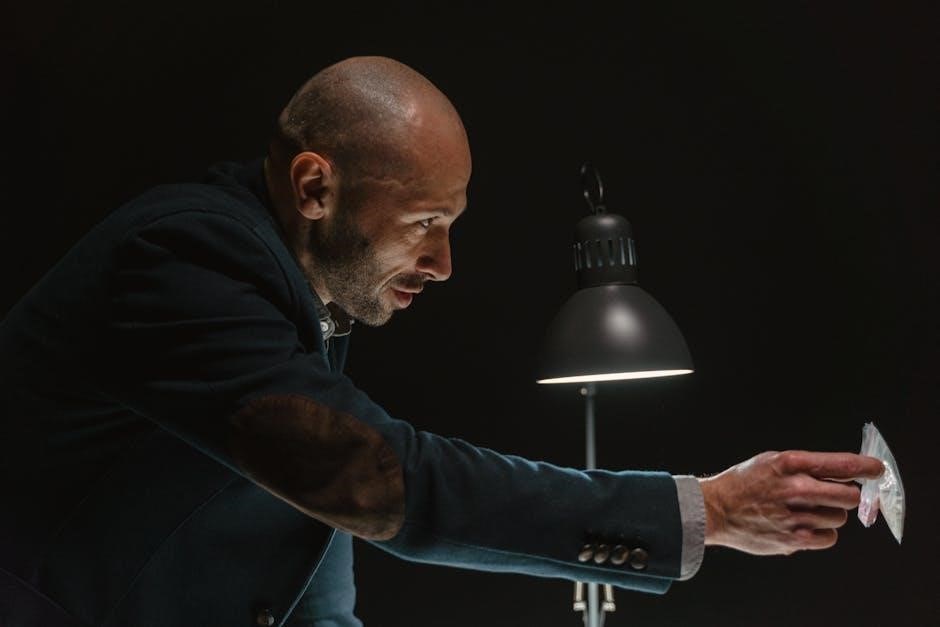
police psychological exam questions and answers pdf
The police psychological exam is a critical step in law enforcement hiring, assessing candidates’ mental fitness and suitability for duty. This guide provides essential sample questions, answers, and preparation strategies to help candidates understand and excel in the exam, ensuring they demonstrate the necessary emotional stability, decision-making skills, and problem-solving abilities required for policing.

Overview of the Police Psychological Exam
The police psychological exam is a comprehensive assessment designed to evaluate a candidate’s mental fitness, emotional stability, and suitability for law enforcement roles. It typically consists of three phases: a self-assessment phase, multiple-choice assessments, and a face-to-face interview. The exam aims to measure personality traits, decision-making abilities, problem-solving skills, stress management, and moral judgment. Candidates are required to answer honestly and demonstrate self-awareness, as the results help determine their potential to handle the stresses of policing effectively. Preparation is key, as the exam plays a crucial role in the hiring process, ensuring only the most mentally prepared individuals advance to become police officers.
Importance of Preparation for the Exam
Preparation for the police psychological exam is vital to ensure success and confidence. Familiarizing oneself with the exam format, including self-assessment, multiple-choice questions, and interview scenarios, helps candidates understand what to expect. Practicing with sample questions and study guides allows individuals to evaluate their personality traits, decision-making skills, and emotional stability. Understanding the scoring mechanism and common question types enables better performance. Preparation also reduces anxiety and ensures honest, thoughtful responses. While there’s no specific content to memorize, mental readiness and self-awareness are crucial. Utilizing practice tests and guides provides a competitive edge, helping candidates demonstrate their suitability for law enforcement roles effectively.

Structure of the Police Psychological Exam
The exam typically includes three phases: self-assessment, multiple-choice assessments, and a face-to-face interview. Each phase evaluates different aspects of a candidate’s mental fitness and suitability for policing roles.
Self-Assessment Phase
The self-assessment phase is the initial step in the police psychological exam, where candidates evaluate their own traits, habits, and behaviors. This phase requires candidates to reflect on their personal characteristics, such as emotional stability, decision-making skills, and interpersonal abilities. It is a self-reflective process that helps candidates identify their strengths and areas for improvement. This phase is crucial as it sets the foundation for the subsequent assessments.
Candidates are encouraged to be honest and accurate in their self-assessment, as this helps psychologists gauge their self-awareness and integrity. The insights gained from this phase are used to guide the multiple-choice assessments and face-to-face interviews, ensuring a comprehensive evaluation of the candidate’s mental fitness for policing roles.
Multiple-Choice Assessments
The multiple-choice assessments are a standardized part of the police psychological exam, designed to evaluate a candidate’s decision-making, problem-solving, and emotional stability. Typically, these assessments include around 100 questions and must be completed within a 15-minute timeframe. The questions cover a wide range of topics, including personality traits, moral judgment, and situational responses. Candidates are expected to choose the most appropriate answer from the given options, reflecting their cognitive abilities and psychological profile. This phase is critical as it provides psychologists with objective data to assess a candidate’s suitability for law enforcement roles. Practicing sample questions can help candidates familiarize themselves with the format and improve their performance.

Face-to-Face Interview
The face-to-face interview is the final phase of the police psychological exam, conducted by a licensed psychologist or psychiatrist. This oral assessment focuses on evaluating a candidate’s self-control, stress management, and moral judgment. Unlike the written tests, this phase does not involve multiple-choice questions but instead allows for open-ended dialogue to delve deeper into a candidate’s thought processes and emotional stability. The interviewer may explore how the candidate handles stressful situations, makes decisions, and maintains composure under pressure. This phase is crucial for assessing whether the candidate possesses the interpersonal skills and psychological resilience required for a career in law enforcement. Preparation for this interview involves reflecting on personal experiences and ensuring honest, thoughtful responses.

Sample Police Psychological Exam Questions and Answers
Sample questions assess personality traits, decision-making, and emotional stability. Examples include, “I like learning new things” or “I plan ahead,” with responses ranging from “Strongly Agree” to “Strongly Disagree.”
Personality Trait Questions
Personality trait questions evaluate candidates’ emotional stability, teamwork skills, and adaptability. Examples include, “I like learning new things” or “I plan ahead,” with responses from “Strongly Agree” to “Strongly Disagree.” These questions assess traits like openness, conscientiousness, and emotional resilience. They help determine if candidates can handle policing’s stress and uncertainty. Honesty is crucial, as the exam identifies potential red flags. Understanding these questions improves self-awareness and preparation. Practice tests provide insights into common personality assessments, ensuring candidates align with law enforcement values. This section is vital for showcasing mental fitness and suitability for the role.
Decision-Making and Problem-Solving Questions
Decision-making and problem-solving questions assess how candidates handle real-life scenarios, moral dilemmas, and stress. These questions evaluate critical thinking, ethical judgment, and the ability to make sound decisions under pressure. Examples include scenarios like handling a hostile crowd or resolving a community conflict. Candidates must demonstrate logical reasoning, prioritization, and the ability to weigh consequences. These questions are designed to mimic the challenges police officers face daily, ensuring they can act responsibly and ethically. Practicing these types of questions helps build confidence and improves the ability to think clearly in high-stress situations. Strong problem-solving skills are essential for maintaining public trust and safety.

Tips for Preparing for the Police Psychological Exam
Study test formats, practice problem-solving, and review personality assessments. Understand scoring mechanisms to improve performance. Stay calm and answer honestly to ensure accurate self-assessment.

Using Practice Tests and Study Guides
Utilizing practice tests and study guides is essential for effective preparation. These resources provide insights into the exam format, helping candidates familiarize themselves with question types and content. Practice tests simulate real exam conditions, allowing individuals to assess their strengths and weaknesses. Study guides often include detailed explanations of answers, enabling deeper understanding. Regular use of these tools improves problem-solving and decision-making skills, which are critical for success. Additionally, updated materials, such as 2025-specific guides, ensure relevance and accuracy. By consistently engaging with these resources, candidates can reduce exam anxiety and enhance overall performance, ultimately increasing their chances of acing the psychological exam.
Understanding the Scoring Mechanism
Understanding the scoring mechanism of the police psychological exam is crucial for interpreting results and improving performance. The exam typically evaluates personality traits, emotional stability, and decision-making abilities. Scores are derived from responses to multiple-choice and true/false questions, with each answer contributing to a candidate’s profile. High scores indicate desirable traits like calmness under stress and sound judgment. Scores are often categorized into pass/fail, with some departments using a sliding scale to assess suitability. Familiarizing oneself with the scoring system through study guides and practice tests helps candidates identify areas for improvement. This knowledge enhances preparation and ensures candidates present their best selves during the evaluation.
Common Mistakes to Avoid During the Exam
One of the most common mistakes candidates make during the police psychological exam is overthinking questions, leading to poor time management. Many also fail to provide consistent answers, raising concerns about honesty or self-awareness. Additionally, some candidates neglect to carefully read instructions, resulting in avoidable errors. Overemphasis on projecting a “perfect” image can backfire, as examiners value authenticity. Others may underestimate the importance of self-assessment, leading to mismatched responses. It’s crucial to avoid guessing answers without a clear rationale, as this can negatively impact scores. Lastly, some candidates fail to manage stress during the exam, which can impair their ability to demonstrate their true capabilities. Staying calm and focused is essential to avoiding these pitfalls.
Where to Find Police Psychological Exam Questions and Answers PDF
Police psychological exam questions and answers PDFs are widely available online, offering valuable preparation tools for candidates; Reputable platforms like JobTestPrep and PoliceTestPrep provide comprehensive study guides and practice tests. Many law enforcement websites offer free downloadable resources, while others require purchase. Additionally, updated 2025 PDFs are accessible, ensuring candidates have the latest materials. These resources include sample questions, detailed explanations, and insights into the exam format. Utilizing these materials helps candidates familiarize themselves with the test structure and improve their performance. Always verify the credibility of the source to ensure accuracy and relevance.
The police psychological exam is a vital tool in ensuring candidates possess the mental fitness and traits necessary for law enforcement roles. Proper preparation and practice are essential for success.
The Role of the Psychological Exam in Police Hiring
The psychological exam plays a crucial role in police hiring by assessing candidates’ mental fitness, emotional stability, and decision-making abilities. It ensures that officers can handle stress, make sound judgments, and maintain public trust. The exam evaluates personality traits, problem-solving skills, and moral judgment, identifying potential issues that could affect job performance. By screening candidates, it helps law enforcement agencies build a capable and reliable workforce. This step is essential for maintaining professionalism and integrity within the police force, ensuring officers are equipped to serve effectively and ethically in challenging situations.
Related Posts

tuya smart lock manual pdf
Need help setting up your Tuya smart lock? Find the official manual in PDF format here! Easy-to-follow instructions & troubleshooting for a secure home. **Tuya Smart Lock** made simple.

code talker book pdf
Download the gripping ‘Code Talker’ book PDF! Explore the incredible true story of Navajo Marines in WWII. A must-read for history buffs & anyone seeking inspiring tales. Get your copy now!

linux kali pdf
Need a quick reference for Kali Linux & PDFs? This guide covers essential commands, security tips, and PDF analysis techniques. Master your digital forensics skills now!